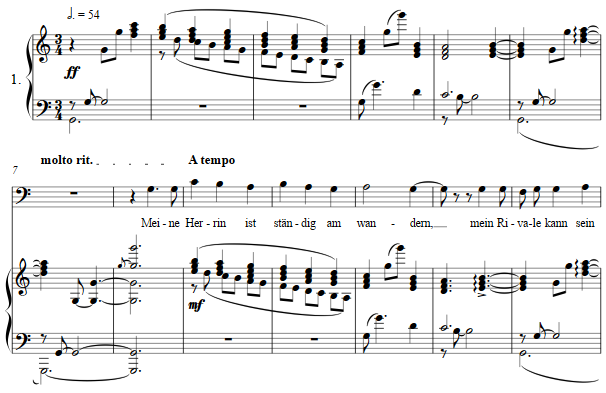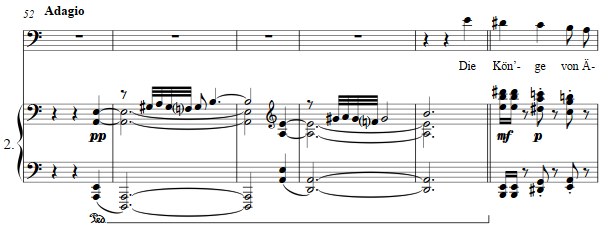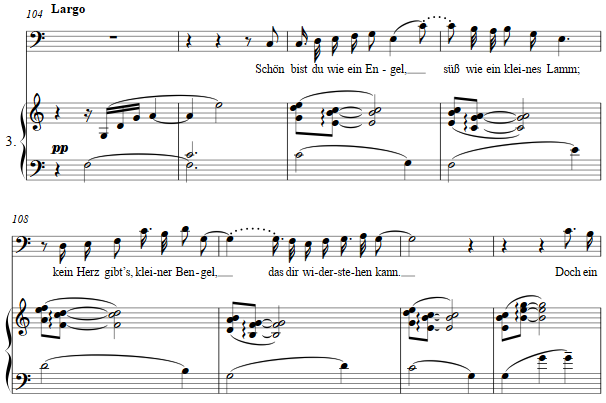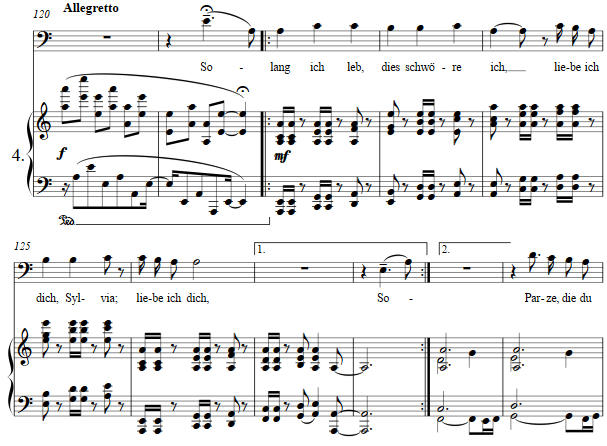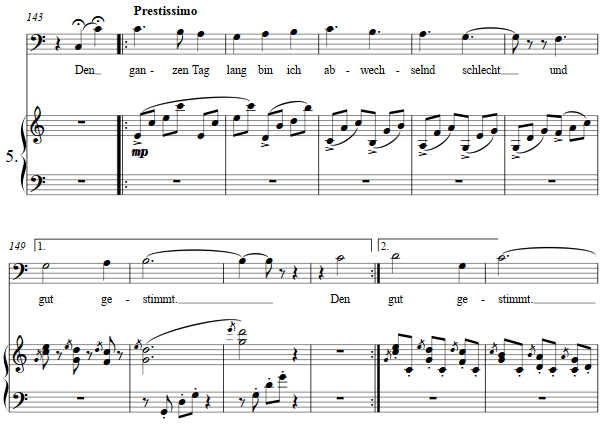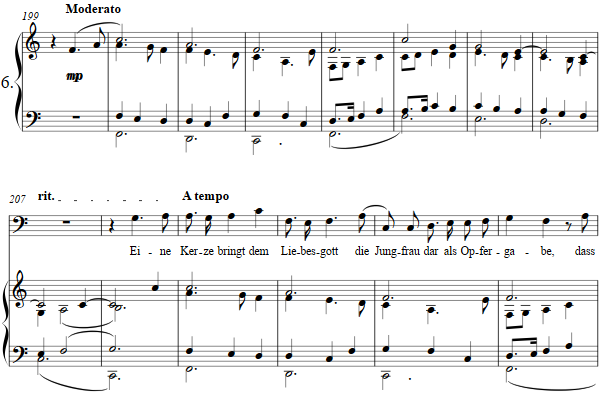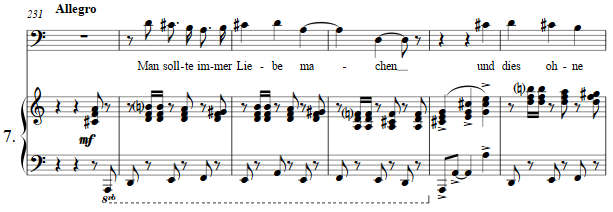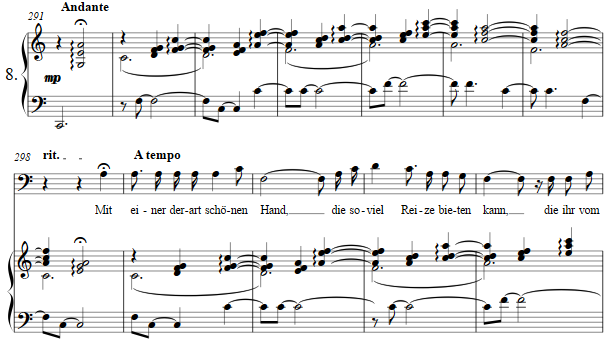Music and Texts of GARY BACHLUND
Vocal Music | Piano | Organ | Chamber Music | Orchestral | Articles and Commentary | Poems and Stories | Miscellany | FAQs
Frivole Lieder - (2015)
texts of Bertram Kottmann
for baritone and piano
i. Die freizügige Geliebte
Meine Herrin ist ständig am wandern,
mein Rivale kann sein Glück kaum ermessen:
Hat die Unschuld sie verloren beim andern,
dann hat sie wohl zwei besessen.
Komme, was da wolle,
solange sie es will.
ii. Trinklied
Die Kön’ge von Ägypten und Syrien
ließen sich einbalsamieren,
um länger als Tote zu halten:
welch’ Narrengestalten!
Lasst uns das Glas erheben,
dies oftmals repetieren,
lasst uns saufen das ganze Leben,
uns jetzt schon einbalsamieren:
Auf den Balsam,
süß und heilsam!
iii. Madrigal
Schön bist du wie ein Engel,
süß wie ein kleines Lamm;
kein Herz gibt’s, kleiner Bengel,
das dir widerstehen kann.
Doch ein Mädchen ohne Titten
ist wie Hühnchen ohne Fritten.
iv. Anrufung der Parzen
Solang ich leb, dies schwöre ich,
liebe ich dich, Sylvia;
Parze, die du in den Händen
unsern Lebensfaden hältst,
spinn, solang du dies vermagst,
meinen länger, bitt ich dich.
v. Bacchantische Couplets
Den ganzen Tag lang bin ich
abwechselnd schlecht und gut gestimmt.
Seh’ ich ’ne leere Flasche Wein,
dann ist’s zum Heulen mir zumut,
ist sie ganz voll, dann geht’s mir gut.
Den ganzen Tag lang bin ich
abwechselnd schlecht und gut gestimmt.
Wenn meine Frau ins Bett mich nimmt,
bin ich die ganze Nacht ganz brav.
Wenn dieses eine Hure tut,
dann geht’s mir richtig gut.
Komm, Schöne, schenk mir nach vom Wein,
dann kann ich froh und glücklich sein.
vi. Die Opfergabe
Eine Kerze bringt dem Liebesgott
die Jungfrau dar als Opfergabe,
dass bald sie ’nen Geliebten habe.
Er lächelte ob dieser Bitte
und sagt, falls sie zu warten habe,
könnt’ stets sie nutzen ihre Gabe.
vii. Goldene Jugend
Man sollte immer Liebe machen
und dies ohne Traualtar.
Man sollte immer Liebe machen
ohne Pfaffe und Notar.
Männer, strebt nicht nach dem Ring,
strebt nur nach dem Dingeling,
strebt nur nach dem Dingeling,
strebt nicht nach dem Ehering,
zielt nur auf ihr Herz,
strebt nicht nach dem Ehering,
zielt nur auf ihr Herz.
Warum denn an den Traualtar,
wenn andrer Männer Frauen gar,
sich nicht bitten lassen,
mit uns sich einzulassen.
Wenn sie dann ganz schmeichelhaft
und mit heißer Leidenschaft
suchen unser Dingeling
suchen unser Dingeling
suchen unser Herz.
viii. Serenade
Mit einer derart schönen Hand,
die soviel Reize bieten kann,
die ihr vom Liebesgott gesandt,
fasst du die Waffen trefflich an.
Und wenn das Kind geworden schlapp,
dann wische ihm die Tränen ab.Copyright © 2015 by Bertram Kottmann
14 pages, circa 10' 30"
Eminent translator and poet, Bertram Kottmann, sent news of his translations of 17th century texts which Poulenc set in French in 1926. As I think of Kottmann's work as more than translation per se, I chose to set his texts this weekend past for the fun of playing with these texts as a unified whole.
Ribaldry in poetry as in prose has a long tradition, and some of these texts are delightfully bawdy, as are they in other languages, which may be found together along with many other examples of Kottmann's prodigious artitrstry at Emily Ezust's fine site, The LiederNet Archive. Click here
for these texts and translations.
For other settings of Bertram Kottmann's texts within this site, click here
.
Set for baritone and piano as is the Poulenc cycle to the French texts, these short songs share hidden features in the construction, limitations I chose for the working out of the settings. The first song tells of the straying mistress in a sometimes philosophic tone.
The second conjures thoughts of embalming, then with thoughts of eternity and now with the goal of getting embalmed before dying.
The third is a sweet ditty in delicate manner declaring something to someone "beautiful as an angel," but....
The fourth is a straightforward declaration of love with an appeal to the fates, perhaps.
The fifth is an interplay between being playful and being all to serious about being playful, of course thoroughly wetted with wine.
The sixth is advice from the god of love.
The seventh tells man not to marry, being clever and wary of the notary and the priest!
The last summarizes, and ends singing a meaningless, and yet meaningful "tra-la-la."
The score is available as a free PDF download, though any major commercial performance or recording of the work is prohibited without prior arrangement with the composer. Click on the graphic below for this piano-vocal score.

